Shelf Awareness for Friday, January 14, 2011
Editors' Note
Quotation of the Day
'What He Was Reading'
"You are watching the wind turn pages of a book
back and forth until the weight of them
stops it somewhere near the beginning.
"Then, a breath moves some of what the wind had in its teeth
forward again and more again to beyond the place where you left off."
News
Notes: New Strategy for Borders Questioned; E-Book Bestsellers
 Borders
Group has told publishers that it is close to securing refinancing from
GE Capital and others and has a plan to "reduce costs, improve
liquidity and expand marketing efforts, as well as sell some assets,"
according to the New York Times.
Borders
Group has told publishers that it is close to securing refinancing from
GE Capital and others and has a plan to "reduce costs, improve
liquidity and expand marketing efforts, as well as sell some assets,"
according to the New York Times.
One publisher told the Times that the plan is not "a convincing strategy." Borders made good on one part of it: it cut 15 more managerial jobs yesterday.
At
the talks between Borders and publishers about Borders's debts, the
publishers are now represented by law firm Lowenstein Sandler and
consultant Alvarez & Marsal, the Times said. Borders had asked the publishers to designate a legal advisor.
---
![]() In
a related note, Diamond Book Distributors has ceased supplying Borders
with titles. Kuo-Yu Liang, Diamond's v-p of sales and marketing,
commented: "Borders has confirmed they have stopped making payments, so
we have put them on shipping hold until this is resolved."
In
a related note, Diamond Book Distributors has ceased supplying Borders
with titles. Kuo-Yu Liang, Diamond's v-p of sales and marketing,
commented: "Borders has confirmed they have stopped making payments, so
we have put them on shipping hold until this is resolved."
---
All those e-reading devices people received as gifts during the holidays continue to pay off in e-book sales. USA Today reported that last week "the e-book outsold the print version for 18 of the top 50 books on the newspaper's bestselling books list, including all three Stieg Larsson novels. The week before, 19 had higher e-book than print sales. That was the first time the top 50 list has had more than two titles in which the e-version outsold print."
--- 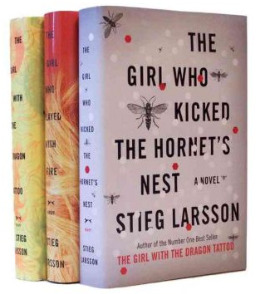 Stieg Larsson dominated USA Today's top 100 bestselling books list for 2010, occupying the first three spots. "Call it escapism or merely a fondness for good stories, but in the midst of a recession at home and wars abroad, fiction seized a record-high share" of last year's list, USA Today wrote, noting that 77% of the weekly bestsellers were novels, up from 76% in 2009 and the highest percentage since the list began in 1993.
Stieg Larsson dominated USA Today's top 100 bestselling books list for 2010, occupying the first three spots. "Call it escapism or merely a fondness for good stories, but in the midst of a recession at home and wars abroad, fiction seized a record-high share" of last year's list, USA Today wrote, noting that 77% of the weekly bestsellers were novels, up from 76% in 2009 and the highest percentage since the list began in 1993.
Other highlights of the analysis:
Romance accounted for 12% of bestsellers, up from 10% in 2009. USA Today suggested that one contributing factor might be that "readers who wouldn't be caught dead with risqué covers in public enjoyed the privacy of reading romantic e-books."
Stephenie Meyer's popularity dipped, with only 4% of bestsellers the list tracked, down from 11% in 2009.
Among nonfiction books, George W. Bush's Decision Points finished fourth for the year, despite a fall release. Laura Bush's memoir, Spoken From the Heart, was number 62.
---
Christine Pisera Naman's book Faces of Hope: Babies Born on 9/11, which was published in 2002 by HCI, has attracted renewed interest because nine-year-old Tucson shooting victim Christina Taylor Green was one of the children featured and President Obama mentioned the title in his speech Wednesday.
"This is all happening very fast," said Kim Weiss, a spokeswoman for the publisher. The Palm Beach Post reported that people have been buying the book--which previously had not sold out of its 10,000-copy first printing--since last Saturday and HCI "is working quickly to begin printing more."
"I did the book as an offering of hope," said Naman. "I wanted it to be a dedication to the people who were lost as well as their loved ones. Then I wanted it to be a little bit of inspiration to the babies born on that day to go out and do good."
--- 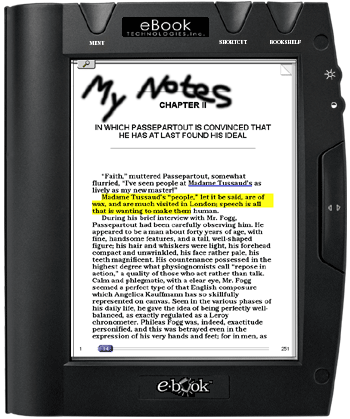 Why did Google acquire eBook Technologies (Shelf Awareness, January 13, 2011)? Mashable suggested that the acquisition is probably more about patents, personnel and technology than hardware or software: "Former eBook Technologies CEO John Rivlin and President Garth Convoy are the inventors of several e-book patents... Google would definitely have an interest in owning that technology and the people who invented it.... Rivlin and Convoy’s expertise in e-books and distribution will likely serve Google well in its quest to distribute its massive library of electronically scanned books to the masses. Couple that with its proprietary technology and it’s no wonder Google forked over the cash for this company."
Why did Google acquire eBook Technologies (Shelf Awareness, January 13, 2011)? Mashable suggested that the acquisition is probably more about patents, personnel and technology than hardware or software: "Former eBook Technologies CEO John Rivlin and President Garth Convoy are the inventors of several e-book patents... Google would definitely have an interest in owning that technology and the people who invented it.... Rivlin and Convoy’s expertise in e-books and distribution will likely serve Google well in its quest to distribute its massive library of electronically scanned books to the masses. Couple that with its proprietary technology and it’s no wonder Google forked over the cash for this company."
---
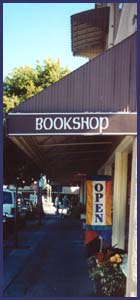 Edmonds Patch profiled Edmonds Bookshop, Edmonds, Wash., which was founded in 1972 and carries a mix of new and used titles.
Edmonds Patch profiled Edmonds Bookshop, Edmonds, Wash., which was founded in 1972 and carries a mix of new and used titles.
The
store is a kind of family--and extended family--affair. Mary Kay
Sneeringer and her husband, David Brewster, bought the shop 10 years ago
from Susan and Barry Hildebrandt. Juliet Brewster, daughter of Mary Kay
and David, works in the store part-time, and former owner Susan
Hildebrandt continues to work three days a week. "They couldn't get rid
of me," she told the Patch.
---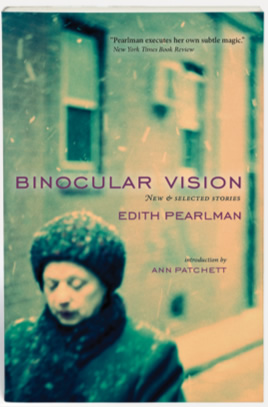 Congratulations to Lookout Books,
the new literary imprint of the Department of Creative Writing at the
University of North Carolina Wilmington: its first title, Binocular Vision: New & Selected Stories by Edith Pearlman, will be reviewed on the cover of the New York Times Book Review this Sunday! It will also be reviewed in the Los Angeles Times.
Congratulations to Lookout Books,
the new literary imprint of the Department of Creative Writing at the
University of North Carolina Wilmington: its first title, Binocular Vision: New & Selected Stories by Edith Pearlman, will be reviewed on the cover of the New York Times Book Review this Sunday! It will also be reviewed in the Los Angeles Times.
Edith Pearlman, who is in her 70s, has won three O. Henry Prizes, her stories have appeared in Best American Short Stories and The Pushcart Prize,
and she has published three previous collections. She has not achieved
widespread recognition, but in the view of Lookout Books, Binocular Vision may well lead to a new focus on Pearlman.
Founded
by Emily Louise Smith and Ben George, the press seeks "emerging and
historically underrepresented voices, as well as works by established
writers overlooked by commercial houses" and aims to be "a haven for
books that matter." Lookout is the joint effort of the Publishing
Laboratory, a teaching press where students of creative writing learn
the publishing process through apprenticeship, and Ecotone, the department's literary magazine. The press will employ interns pursuing MFA degrees.
Lookout publishes trade paperback originals. Its second title is Steve Almond's story collection, God Bless America, which will appear this fall.
--- 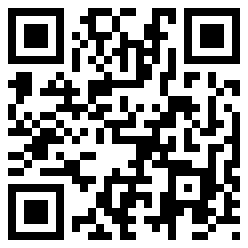 In a piece headlined "Blending Online and Bricks-and-Mortar Shopping," Bookselling This Week interviewed Pete Mulvihill of Green Apple Books, San Francisco, Calif.; and Matt Norcross, McLean & Eakin Booksellers, Petoskey, Mich., about their use of QR codes.
In a piece headlined "Blending Online and Bricks-and-Mortar Shopping," Bookselling This Week interviewed Pete Mulvihill of Green Apple Books, San Francisco, Calif.; and Matt Norcross, McLean & Eakin Booksellers, Petoskey, Mich., about their use of QR codes.
Both booksellers have "designed shelf-talkers featuring QR codes. Customers can scan the square codes with their smartphones and go directly to the featured titles on the store’s IndieCommerce website. Once there, they can save the information or immediately buy and download the e-books."
---
A glimpse of the future? Ion Audio's "venture into the book-digitizing business," the $149 Book Saver, "promises one-second color scans of both pages of a book" and is scheduled to be available in June "at places like Barnes &  Noble, Staples, and Office Depot," according to Engadget, which cautioned that the "big problem here is that there's no automation for page turning, and worse yet, you'll need to lift the entire, somewhat fragile, scanner in order to flip to the next page."
Noble, Staples, and Office Depot," according to Engadget, which cautioned that the "big problem here is that there's no automation for page turning, and worse yet, you'll need to lift the entire, somewhat fragile, scanner in order to flip to the next page."
Cnet News observed that "publishing has wrestled with piracy for years, but one of the reasons the sector hasn't been hit as hard by illegal file sharing as much as the music or film industries is that there isn't an easy way to digitize books. Scanning them is typically labor intensive.... Book publishers should know that eventually someone or some company, maybe even Ion, will streamline the process."
---
Obituary notes:
Editor and publisher Ruth Cavin died earlier this week. She was 92 and had "remained active as associate publisher of Thomas Dunne Books, an imprint of St. Martin’s Press, where she was credited with having acquired and edited some 900 books in the 22 years since she was hired, at age 70," the Times wrote.
Crime writer Joe Gores, whose work was compared with Dashiell Hammett's and who wrote a sequel to The Maltese Falcon, died Monday. He was 79.
John Gross, editor of the Times Literary Supplement in London in the 1970s and a book critic for the New York Times in the 1980s, died Monday, the Times reported. He was 75.
--- James Bond fans flying to Jamaica can now land at Ian Fleming International Airport, "close to the scenic retreat where the late author reportedly wrote all 14 of his books about the elegant, crafty spy," the Huffington Post reported, adding that several 007 movies, including Live and Let Die and Dr. No, were filmed near Fleming's estate.
James Bond fans flying to Jamaica can now land at Ian Fleming International Airport, "close to the scenic retreat where the late author reportedly wrote all 14 of his books about the elegant, crafty spy," the Huffington Post reported, adding that several 007 movies, including Live and Let Die and Dr. No, were filmed near Fleming's estate.
---
Boing Boing featured Tom the Dancing Bug's classix comix version--using illustrations from the first edition--of the Adventures of Huckleberry Finn (Corrected to reflect modern sensibilities).
---
The Guardian asked readers to check their literary balances with a "banking in literature" quiz.
---
Noting that "2011 is quickly shaping up to also be a year of fresh books by and about beloved bygone writers," Flavorwire showcased "New Books About Old Favorites."
---
Book trailer of the day: Shadowfever by Karen Marie Moning (Delacorte), which goes on sale on Tuesday.
--- 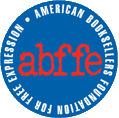 The American Booksellers Foundation for Free Expression has moved, Bookselling This Week reported. ABFFE's new address is 19 Fulton Street, Suite 407, New York, N.Y. 10038. The organization's phone and fax numbers remain the same: 212-587-4025 and 212-587-2436, respectively.
The American Booksellers Foundation for Free Expression has moved, Bookselling This Week reported. ABFFE's new address is 19 Fulton Street, Suite 407, New York, N.Y. 10038. The organization's phone and fax numbers remain the same: 212-587-4025 and 212-587-2436, respectively.
Media and Movies
Media Heat: The Longest War
Sunday on CNN's State of the Union with Candy Crowley: Peter Bergen, author of The Longest War: The Enduring Conflict between America and Al-Qaeda (Free Press, $28, 9780743278935). He will also be on the Daily Show and Anderson Cooper 360 on Monday.
---
Monday on the Colbert Report: Sherry Turkle, author of Alone Together: Why We Expect More from Technology and Less from Each Other (Basic Books, $28.95, 9780465010219).
Television: Locke & Key
Nick Stahl has been added to the cast of Fox's pilot Locke & Key, based on author Joe Hill's comic. Deadline.com reported that the project "was originally targeted for summer but is now for fall consideration."
Kevin Reilly, Fox entertainment president, said, "They just simply couldn't make the dates. We were going to rush it creatively. So we've got it in the hopper now for May, and we'll just figure out where it should be programmed best."
Movies: One Day
 Focus Features has set a domestic theatrical release date of July 8 for One Day, the film version of the bestselling novel by David Nicholls, who also wrote the screenplay. Lone Scherfig (An Education) directs the movie starring Anne Hathaway and Jim Sturgess. The U.K. release is scheduled for September 29.
Focus Features has set a domestic theatrical release date of July 8 for One Day, the film version of the bestselling novel by David Nicholls, who also wrote the screenplay. Lone Scherfig (An Education) directs the movie starring Anne Hathaway and Jim Sturgess. The U.K. release is scheduled for September 29.
The film is a co-production in the partnership of Random House Films division and Focus. The U.K.'s Film4 is co-financing. Nina Jacobson (Diary of a Wimpy Kid movies) is producing One Day and the executive producer is Tessa Ross, controller, Film4 & Channel 4 drama.
"This has been a wonderful process for all of us from beginning to end: from working with David Nicholls on the tremendously successful Vintage publication of the novel; to working with Focus during the development and filmmaking process; to seeing the superb film that Lone Scherfig has made," said Random House Films president Peter Gethers. "We're all extremely excited that, come July, audiences will get to experience the film--and so many more people will go out and discover the book."
Books & Authors
Awards: Langum Winners; Waterstone's Children's Book Shortlist
The Langum Prize for American Historical Fiction for 2010, sponsored by the Langum Charitable Trust, has been awarded to Ann Weisgarber for The Personal History of Rachel DuPree (Viking). Director David J. Langum, Sr., wrote in part: "Several books have appeared recently depicting the role of blacks in the development of the American West, for example as park rangers or Buffalo Soldiers. Yet this well-written debut novel may be the first centering on a black family as homesteaders.... The writing and imagery is beautiful, but the main strength of the book is the insight into the impact of pioneer life on the husband and wife. It is reminiscent of the writings of Ole Rolvaag in its insistence that the western frontier experience was not just a matter of 'upward and onward,' but that it came at a high human cost."
Honorable Mention went to Robin Oliveira for My Name Is Mary Sutter (Viking), "an impressive debut novel, but more than that it is a masterly work of historical fiction. A powerful and engaging story of a young woman's quest to become a physician in nineteenth-century America."
There were two director's mentions:
Kelli Carmean for Creekside: An Archeological Novel (University of Alabama Press), "an interesting story of a multi-generational pioneer family farm in Eastern Kentucky [that] is combined with a fictional account of a modern archeological dig at that same location.... one of the very few, perhaps the only, historical fictions informed by archeology."
Jackson Taylor for The Blue Orchard (Simon & Schuster). "From an Irish immigrant family, Verna Krone leaves school at eight and begins work as a maid to help support her family.... After considerable inner conflict she becomes a nurse for a black doctor whose principal practice is abortion. The motivations of both doctor and nurse are interesting and more complex than either a cynical desire to make money or an altruistic wish to help unfortunate women out of unwanted pregnancies."
---
Curtis Jobling, designer of the Bob the Builder TV show, is shortlisted for the annual £5,000 (US$7,931) Waterstone's Children's Book Prize for his debut novel Wereworld: Rise of the Wolf, BBC News reported. The winner of this year's prize, which is open to authors writing for 7-13 year-olds who have written two fiction titles or less, will be announced by U.K. children's laureate Anthony Browne on February 9. The complete shortlist:
The Memory Cage by Ruth Eastham
Tall Story by Candy Gourlay
The Pain Merchants: The Healing Wars by Janice Hardy
Wereworld: Rise of the Wolf by Curtis Jobling
Fantastic Frankie and the Brain-Drain Machine by Anna Kemp
A Beautiful Lie by Irfan Master
Mortlock by Jon Mayhew
When You Reach Me by Rebecca Stead
Book Brahmin: Orson Scott Card
 Orson Scott Card is best known for Ender's Game, Ender's Shadow and Speaker for the Dead.
He received the 2008 Margaret A. Edwards Award for lifetime achievement in YA
literature from the American Library Association. His novel Ender's Game (1985) and its sequel Speaker
for the Dead (1986) both won the
coveted Hugo and the Nebula Awards--making Card the only author to win both of
the U.S.'s top SF prizes in consecutive years. His latest novel is The Lost
Gate (Tor, January 4, 2011), the first
book in his new Mither Mages series.
Orson Scott Card is best known for Ender's Game, Ender's Shadow and Speaker for the Dead.
He received the 2008 Margaret A. Edwards Award for lifetime achievement in YA
literature from the American Library Association. His novel Ender's Game (1985) and its sequel Speaker
for the Dead (1986) both won the
coveted Hugo and the Nebula Awards--making Card the only author to win both of
the U.S.'s top SF prizes in consecutive years. His latest novel is The Lost
Gate (Tor, January 4, 2011), the first
book in his new Mither Mages series.
Card was born in Washington State and grew up in California, Arizona and Utah. He recently took a position as a professor of writing and literature at Southern Virginia University. He lives in North Carolina, with his wife, Kristine Allen Card, and their youngest child, Zina Margaret. Sadly, Card suffered a mild stroke earlier this month; he is recovering, and is now back home, retraining his brain so that the fingers of his left hand strike the keys he's aiming for.
On your nightstand now:
Then Sings My Soul, a collection of hymns and their (brief) histories that I'm considering as a textbook for the class in hymn and lyric writing that I'm teaching at Southern Virginia University this winter.
The Last Days of Ptolemy Grey by Walter Mosley. In my iPod Nano, I'm listening to President Bush's memoir, Decision Points.
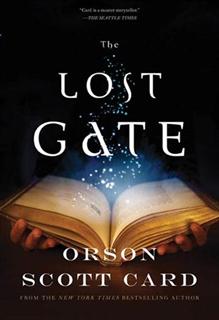 Favorite
book when you were a child:
Favorite
book when you were a child:
That changed from year to year! For a time, it was Mr. Mocker by Thornton W. Burgess, followed by Rabbit Hill by Robert Lawson and the Book of Mormon Stories for Young Latter-day Saints by Emma Mar Peterson. At about age eight, I graduated to Joseph Altsheler's Civil War series of YA novels. Then it was The Prince and the Pauper by Mark Twain, followed by Dawn's Early Light and Yankee Stranger by Elswyth Thane (from my mother's collection). I read C.S. Lewis's Screwtape Letters and was transformed, and when my parents gave me Dale Carnegie's How to Win Friends and Influence People I was transformed again--you mean you can actually learn how to get along with other people? After Gone with the Wind, I found Andre Norton's Galactic Derelict and The Time Traders, along with Heinlein's Tunnel in the Sky and Citizen of the Galaxy, making me for the first time a certified sci-fi reader. Then I went through an Agatha Christie phase in high school, and didn't come back to sci-fi until college, when Ray Bradbury's writing taught me about cadenced, poetic narrative, while Asimov's Foundation trilogy set me a standard for clarity of prose. In college I also had the normal Ayn Rand phase. For a time, every one of these books or authors was my favorite ever. I suppose I was rather fickle. But really, how long can Rabbit Hill be your favorite?
Your top five authors:
William Shakespeare (he taught me both characterization through motive and how to write in blank verse while keeping the language natural); Jane Austen (the greatest novelist who ever lived; her work is so self-contained yet captures her culture so thoroughly); J.R.R. Tolkien (The Lord of the Rings is the greatest work of literature in any language in the 20th century, even though in some ways he was creating the literature of the 10th century all over again); Isaac Asimov (the consummate master of the American plain style, nobody write with greater clarity, ever); Ray Bradbury (the consummate master of cadenced writing, filled with music yet always in the service of a strong story).
Joseph Smith is in a special situation, since his writings are tied up with revelation, scripture and theology, as he singlehandedly undid the entire Western philosophical tradition and rediscovered a primitive, non-neoplatonic Christianity. No matter what I write, both J.S.'s language and his worldview are inside my head, looking out.
Book you've faked reading:
I have never faked reading any book in my life. Not finishing a book is a strong review of it!
Book you're an evangelist for:
I've been trying to get everyone on Earth to read Neal Shusterman's Everlost and Patrick Rothfuss's The Name of the Wind and William Sleator's Singularity; and for years I've been pushing Robin Hobb's Ships series on anyone who would hold still. And if you haven't read Mette Ivie Harrison's Mira, Mirror, then git 'er done!
Book you've bought for the cover:
None. There are books I've picked up for the cover, or even for a cover quote, but the first few pages have to win me, and that's what I buy for. It doesn't mean I haven't been disappointed, but....
Books that changed your life:
Army of the Potomac by Bruce Catton and The Rise and Fall of the Third Reich by William L. Shirer when I was a fifth-grader. They both tore me apart but also gave me an understanding of politics, the military, history in general, and the depths and heights of human nature. More than any fiction I've read, these books formed me.
Favorite line from a book:
I'm not much of a book quoter. It's the story, not individual lines, that I hold in my memory.
Book you most want to read again for the first time:
I wish I could read any of my books for the first time, if only to know why some of them work with a large audience, and some of them remain favorites of only a few. To me, they were all wonderful as I was writing them, and painfully full of mistakes of every kind when I reread them. I wish I could read them all as my readers do, with no idea of what's coming.
Book Review
Book Review: Battle Hymn of the Tiger Mother
Battle Hymn of the Tiger Mother by Amy Chua (Penguin Press, $25.95 Hardcover, 9781594202841, January 2011)
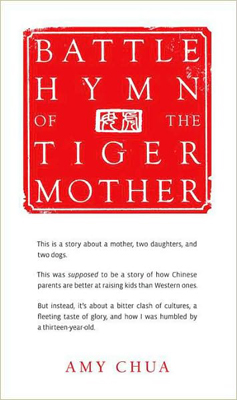 Motherhood memoirs ("momoirs') have become as plentiful as pansies in the last decade or so (full disclosure: I have written one as well), producing a number of subgenres, from mothering special needs children to being a bad (but not really) mommy. Despite the variety in tone and topic, the true feelings of the mothers writing these books is never in question. What makes Amy Chua's mother-from-hell memoir truly unusual--and unusually compelling--is that the author never really tips her hand. One assumes, for example, that while she might regularly berate and shame her daughters for anything less than perfection, force them to practice piano and violin daily for hours on end (even during vacations), and never allow them to participate in school plays or sleepovers in private, there is no way she'd admit to it in public unless it was all an exaggeration. The gulag-type atmosphere in which Chua is raising her daughters must be a tongue-in-cheek representation, one thinks. Unless it isn't.
Motherhood memoirs ("momoirs') have become as plentiful as pansies in the last decade or so (full disclosure: I have written one as well), producing a number of subgenres, from mothering special needs children to being a bad (but not really) mommy. Despite the variety in tone and topic, the true feelings of the mothers writing these books is never in question. What makes Amy Chua's mother-from-hell memoir truly unusual--and unusually compelling--is that the author never really tips her hand. One assumes, for example, that while she might regularly berate and shame her daughters for anything less than perfection, force them to practice piano and violin daily for hours on end (even during vacations), and never allow them to participate in school plays or sleepovers in private, there is no way she'd admit to it in public unless it was all an exaggeration. The gulag-type atmosphere in which Chua is raising her daughters must be a tongue-in-cheek representation, one thinks. Unless it isn't.
The eldest child of an overachieving family of Chinese immigrants (her youngest sister, born with Down syndrome, has won two gold medals in the Special Olympics), Chua was determined to raise her daughters Sophia and Lulu "the Chinese way." Theoretically, this meant instilling in them respect, duty and a flawless work ethic while cultivating their musical talent with constant practice until they achieved Carnegie Hall-ready solo status. What it meant practically, however, was an autocratic, shrill parenting style (one she readily admits is stereotypical) that resulted in countless hours of screaming matches, torn sheets of music, arguments with her otherwise understanding Jewish husband, teeth marks in the piano and, ultimately, a full-scale rebellion by Lulu.
Chua is stridently unapologetic about the lengths to which she pushes her daughters and herself in her quest for perfection and her desire to avoid what she sees as lazy, indulgent Western parenting. Indeed, her efforts do bear fruit; both girls excel academically, but more importantly musically. Sophia did play at Carnegie Hall when she was barely a teenager and Lulu might have followed suit with the violin were it not for a complete rejection of Chua's relentless, punitive attempts to control her. Because Chua's tone remains consistent throughout (she never admits to being at fault, nor gives an inch on her philosophy), it is easy to classify her parenting as borderline abusive. Too easy, in fact. A more careful read reveals a much more nuanced mother; one who has a very well developed sense of irony, is deeply funny, unquestionably devoted to her children, and not altogether wrong.--Debra Ginsberg
Shelf Talker: An unusual and thought-provoking memoir from Amy Chua about trying to raise her daughters "the Chinese way." Sometimes alarming, often very funny, and always compelling.
Deeper Understanding
Robert Gray: Indie Booksellers & E-Pricing
Indie e-bookselling will probably be a popular conversation topic at ABA's Winter Institute next week, so it makes sense to come back to the discussion we began here before the holidays regarding booksellers' initial response to the Google eBookstore and its potential as (okay, I'll use the term just this once) a "game-changer."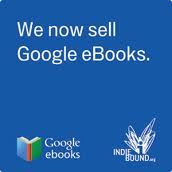 The conversation now turns to pricing because last month, Sarah Pishko of Prince Books, Norfolk, Va., expressed surprise "at how few booksellers have bothered to discount the non-agency titles. I'm thinking primarily about Random House. I spot-checked a number of RH titles, and it looks like our discount would be 41%. So I've got them listed at 30% off, but a lot of major bookstores have failed to do so. That said, I guess I was very lucky to get Scott Nafz on the phone, and he talked me through it."
The conversation now turns to pricing because last month, Sarah Pishko of Prince Books, Norfolk, Va., expressed surprise "at how few booksellers have bothered to discount the non-agency titles. I'm thinking primarily about Random House. I spot-checked a number of RH titles, and it looks like our discount would be 41%. So I've got them listed at 30% off, but a lot of major bookstores have failed to do so. That said, I guess I was very lucky to get Scott Nafz on the phone, and he talked me through it."
Chuck Robinson of Village Books, Bellingham, Wash., is also surprised by the lack of discounting he's seen thus far: "We decided to discount the non-agency e-books. I know that some stores are adamantly opposed to any discounting (I usually find myself in that crowd), but this seems a special case, since prices were not initially established at bricks-and-mortar retail, but by online retailers. We're not discounting below what we're paying (as online Amazon et al apparently are--unless they're getting special deals), but we figure a sale with any income is better than no sale at all, and it keeps our customer with us."
Bookshop Santa Cruz, Santa Cruz, Calif., is discounting bestsellers and many Random House titles, with plans to discount more RH books in the near future. Casey Coonerty Protti notes that "one of the drawbacks of launching in mid-December is that we didn't have the staffing from the get-go to focus on these issues). A few customers have written us about pricing and we've changed books manually to meet their needs." With a touch of humor, she adds it's all "about resources and time, something that indies have in abundance."
Time has also been a factor for Neil Strandberg of the Tattered Cover Book Store, Denver, Colo.: "As to non-agency pricing, we remain commited to noodling the math of what to discount, by how much, and how to feature it. It just so happens that I've been preoccupied by some very brick-and-mortar concerns these last three weeks: How was the holiday season? How is the payroll level? What must I return? Where's my gross margin?"
The learning curve is key for Susan Fox of Red Fox Books, Glens Falls, N.Y., who says, "We are still learning the Drupal system (we just switched before the holidays, so we haven't had time to play around with it much) and just figuring out how to adjust e-book prices. We are going to lower the prices on some hot titles, like The Girl with the Dragon Tattoo. But to be honest, I can't imagine a more daunting task than searching through all Random House and other non-agency titles to change the prices. I suppose for stores with many employees this is do-able (and no doubt Amazon has an entire department to handle this task), but it's just not something we have time for. And since we're not selling any Google eBooks it's hard to feel the urgency behind this."
Up to this point, Lanora Hurley of the Next Chapter Bookshop, Mequon, Wis., has "made the deliberate decision to not adjust the prices. Since there does not seem to be much demand so far, at least from us, I just haven't had the time over the holidays to look at it. I suppose that I should."
Anne Holman of the King's English Bookshop, Salt Lake City, Utah, is anticipating future changes: "We are planning on discounting selected titles that will tie to our internal bestseller list. That way we can still talk about the books we love and offer our customers a deal. We won't be discounting across the board as each publisher seems to have very different discounts but we will be looking at individual titles strategically. "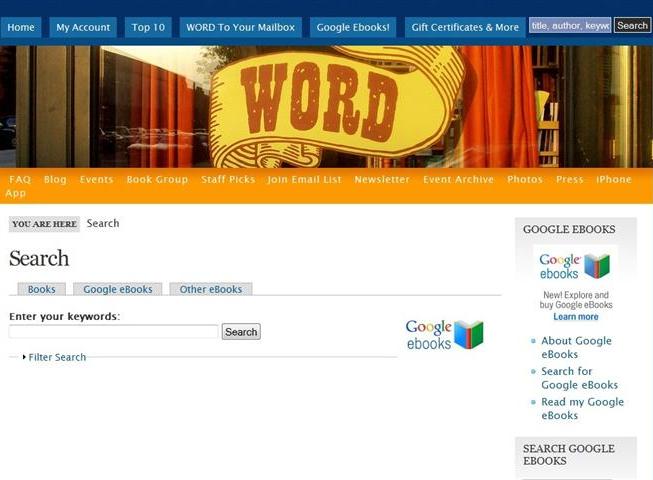 As far as booksellers choosing not to discount is concerned, Christine Onorati of WORD, Brooklyn, N.Y., observes she "wouldn't be surprised if for some it was just something they don't know how to do on their site, and maybe they don't have a savvy tech person to explain it to them. It is not the most intuitive process, to be honest, and no one wants to discuss pricing and discounts in public forums, so maybe that's a factor? That's the only reason I can think of. But we are discounting everything non-agency by 20%, so our margins of profit for agency and non-agency titles are pretty much the same at that rate."
As far as booksellers choosing not to discount is concerned, Christine Onorati of WORD, Brooklyn, N.Y., observes she "wouldn't be surprised if for some it was just something they don't know how to do on their site, and maybe they don't have a savvy tech person to explain it to them. It is not the most intuitive process, to be honest, and no one wants to discuss pricing and discounts in public forums, so maybe that's a factor? That's the only reason I can think of. But we are discounting everything non-agency by 20%, so our margins of profit for agency and non-agency titles are pretty much the same at that rate."
Onorati also shared a recent pricing story: "One customer e-mailed me about the pricing issue in regards to Cloud Atlas, which she tried to buy from our site, but Google was having technical difficulties with it, so she bought it from Amazon at a considerable discount instead and let me know that--in case I wasn't aware of how cheaply Amazon was selling their e-books. It's definitely one of the biggest frustrations, since most customers don't understand the agency model and the extreme price divide between us and Google direct/Amazon."
The conversation didn't end there, however: "I explained it to her as succinctly as I could, and even explained that I am discounting all non-agency titles by 20%, and she was really nice about it and asked me to suggest a few more e-books that she should consider for a long plane trip. I sent her a few suggestions and the next day she purchased Skippy Dies, an MPS title at a competitive price. So a little bit of explanation seemed to help in that case, and through our e-mail conversation she told me she lives in a neighboring town and therefore can't shop at my store as often as she'd like, but that she's thrilled she can at least purchase her e-books from me, so hopefully I've gained a new loyal customer from it all. I know I won't have the opportunity to explain the pricing issues to all the customers who are confused by it, but we'll do our best to let them know we're discounting as much as we can."
Next week: e-handselling now.--Robert Gray (column archives available at Fresh Eyes Now)
The Bestsellers
800-CEO-READ's December Business Book Bestsellers
Based on purchases by its corporate customers nationwide, 800-CEO-READ presented a list of the 25 top-selling business books for December. The top-10 bestsellers were:
- How: Why How We Do Anything Means Everything... in Business (and in Life) by Dov Seidman
- Rich Dad's Prophecy: Why the Biggest Stock Market Crash in History Is Still Coming... and How You Can Prepare Yourself and Profit from It by Robert T. Kiyosaki and Sharon Lechter
- Mojo: How to Get It, How to Keep It, How to Get It Back if You Lose It by Marshall Goldsmith & Mark Reiter
- Inside Every Woman: Using the 10 Strengths You Didn't Know You Had to Get the Career and Life You Want Now by Vickie L. Milazzo
- Strengths Finder 2.0 by Tom Rath
- Wellbeing: The Five Essential Elements by Tom Rath & Jim Harter
- The CIO Edge: Seven Leadership Skills You Need to Drive Results by Graham Waller, Karen Rubenstrunk & George Hallenbeck
- What Got You Here Won't Get You There: How Successful People Become Even More Successful by Marshall Goldsmith & Mark Reiter
- The Go-Giver: A Little Story About a Powerful Business Idea by Bob Burg & John David Mann
- Brains on Fire: Igniting Powerful, Sustainable, Word of Mouth Movements by Robbin Phillips, Greg Cordell, Geno Church & Spike Jones











